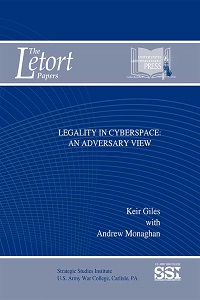Legality in Cyberspace: An Adversary View

Authored by Keir Giles, Dr. Andrew Monaghan
March 2014
58 Pages
Brief Synopsis
While conflict in cyberspace is not new, the legality of hostile cyber activity at a state level remains imperfectly defined. While there is broad agreement among the United States and its allies that cyber warfare would be governed by existing laws of armed conflict, with no need for additional treaties or conventions to regulate hostilities online, this view is not shared by many nations that the United States could potentially face as adversaries. The author illustrates the very distinct set of views on the nature of conflict in cyberspace that pertains to Russia. He provides an important window into Russian thinking and explains how fundamental Russian assumptions on the nature of cyber activity need to be considered when countering, or engaging with, Russian cyber initiatives.
Summary
The United States and its allies are in general agreement on the legal status of conflict in cyberspace. Although key principles remain unresolved, such as what precisely constitutes an armed attack or use of force in cyberspace, overall there is a broad legal consensus among Euro-Atlantic nations that existing international law and international commitments are sufficient to regulate cyber conflict.
This principle is described in multiple authoritative legal commentaries. But these can imply misleadingly that this consensus is global and unchallenged. In fact, China, Russia, and a number of like-minded nations have an entirely different concept of the applicability of international law to cyberspace as a whole, including to the nature of conflict within it. These nations could therefore potentially operate in cyberspace according to entirely different understandings of what is permissible under international humanitarian law, the law of armed conflict, and other legal baskets governing conduct during hostilities.
U.S. policymakers cannot afford to underestimate the extent to which Russian concepts and approaches differ from what they may take for granted. This includes the specific question of when, or whether, hostile action in cyberspace constitutes an act or state of war. Recent Russian academic and military commentary stresses the blurring of the distinction between war and peace, and asks to what extent this distinction still exists. This suggestion of a shifting boundary between war and peace is directly relevant to consideration of at what point Russia considers itself to be at war and therefore subject to specific legal constraints on actions in cyberspace.
Conversely, actions that are considered innocent and friendly by the United States and European nations are parsed as hostile actions by Russia, leading to Russian attempts to outlaw “interference in another state’s information space.” The Russian notion of what constitutes a cyber weapon—or in Russian terminology, an information weapon—is radically different from our assumptions.
Initiatives put forward by Russia for international cooperation on legal initiatives governing cyber activity have received a mixed response from other states. But they need to be taken into account because of the alternative consensus on cyber security opposing the views of the United States and its close allies, which is growing as a result of an effective Russian program of ticking up support for Moscow’s proposals from other countries around the world.
This Letort Paper explores the Russian approach to legal constraints governing actions in cyberspace within the broader framework of the Russian understanding of the nature of international law and commitments, with the aim of informing U.S. military and civilian policymakers of views held by a potential adversary in cyberspace. Using a Russian perspective to examine the legal status of various activities in cyberspace, including what constitutes hostile activity, demonstrates that assumptions commonly held in the United States may need to be adjusted to counter effectively—or engage with—Russian cyber initiatives.
Access Full Report [PDF]: Legality in Cyberspace: An Adversary View
|
NEWSLETTER
|
| Join the GlobalSecurity.org mailing list |
|
|
|

